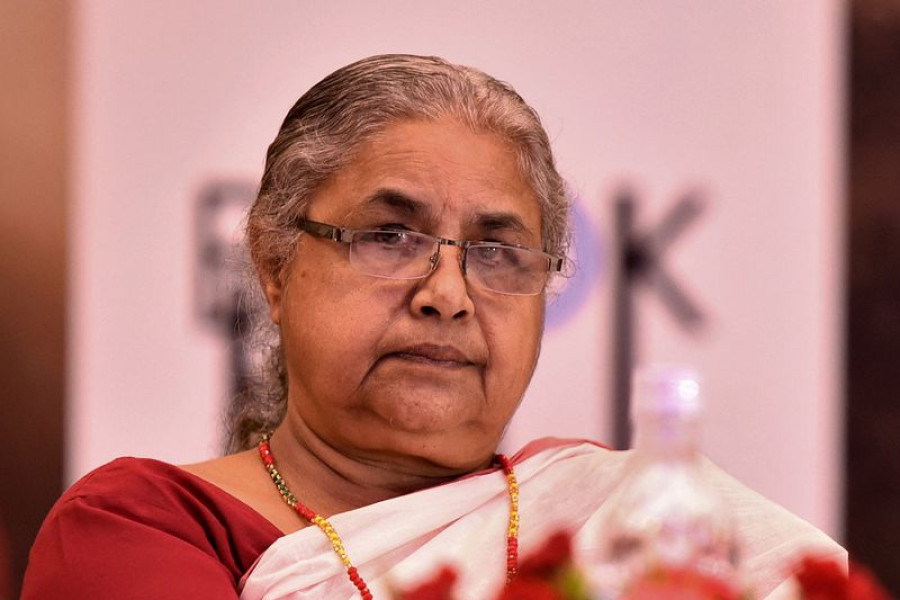Politics
She made history as first woman chief justice of Nepal. Now as PM
Former chief justice Karki, widely praised for her integrity, was chosen by Gen Z to guide the country through historic transition.
Binod Ghimire
Sushila Karki, a septuagenarian former chief justice, yet again registered her name in Nepali history as the country’s first female executive head. In July 2016, she was appointed the first woman chief justice of Nepal.
Following multiple rounds of deliberations, the Gen Z movement, which toppled the KP Sharma Oli-led government, agreed that Karki would lead the transitional government. She had gotten the most votes among Gen Z voters on Discord, a free communication platform on Wednesday, making her the most favoured candidate to lead the post-revolution government.
Not only the youngsters. She also emerged as the most acceptable figure for the traditional political forces.
Born on June 7, 1952, in Shankarpur of the present-day Biratnagar Metropolitan City, she studied at Mahendra Morang College in Biratnagar. She completed her Bachelor’s in Arts at the age of 20.
After that she moved to India for higher studies, where she completed a master’s degree from Banaras Hindu University. Upon her return, Karki studied law and, at 26, completed her Bachelor of Law (BL) from Tribhuvan University in 1978.
A year after earning her BL, on March 30, 1979, Karki began her career as a lawyer. But she was more than a practicing lawyer: from 1986 to 1989, she also taught at Mahendra Multiple Campus in Dharan.
During her time as a legal professional, she served as the president of the Koshi Zonal Bar from 1988 to 1990. She was also the president of the Biratnagar Appellate Bar from 2002 to 2004.
More accomplishments were to follow. She earned the title of a senior advocate on December 19, 2004. Four years later, on January 22, 2009, she was appointed temporary justice of the Supreme Court. And two years after that, on November 18, 2010, she became a permanent justice of the Supreme Court.
And, six years later, in July 2016, she became the first woman chief justice and led the judiciary for around a year. She retired in June 2017 upon reaching the mandatory retirement age. This was after the Sher Bahadur Deuba-led ruling coalition had brought an impeachment motion in April—which was at the time seen as an attempt to block her verdict on the police chief appointment.
Those who have worked with her describe Karki as courageous and possessing the highest level of integrity. She is also known for her spartan lifestyle. Ananda Mohan Bhattarai, former Supreme Court justice, says Karki and her husband have made significant contributions to the country’s democratic movement.
They are true Gandhians, not just in ideology but also in lifestyle. “She has agreed to shoulder such a big challenge, which shows her courage. We all need to support her,” said Bhattarai, former Supreme Court justice who worked with her. “I am hopeful that she will carry the country through this transition period by fully honouring democratic principles.”
Karki has always been vocal against corruption. During her term as chief justice, her bench issued landmark verdicts in corruption cases against politicians.
Karki’s benches passed several landmark verdicts. A division bench she led convicted then-communications minister Jaya Prakash Prasad Gupta on a corruption charge in February 2012. This was the first time a sitting minister was sent to jail for corruption.
Likewise, it was her bench that ordered the hearing of the petition challenging the appointment of Lokman Singh Karki, a notorious figure, as the chief commissioner of the Commission for the Investigation of Abuse of Authority. Following this, a three-member bench (which did not include Karki) terminated his appointment.
In another verdict, she directed the government to investigate a Nepali Army official in the rape and murder case of Maina Sunar in Kavrepalanchok. Later, the district court convicted the army officials involved.
Though she entered the top court on the Nepali Congress quota, Karki never compromised on her integrity, according to those who have closely followed her career.
She is married to Durga Subedi, a Congress leader, who was involved in the famous plane hijacking incident from 1973, orchestrated to fund the anti-Panchayat movement.
“She has always had a high level of integrity,” said senior advocate Bipin Adhikari, professor at Kathmandu University School of Law. He added that, in these challenging times, she needs a sound team to lead the government effectively. “She must have capable people around her to ensure the government functions successfully,” he said.
Some argue that it might be difficult for her to align her thinking with the ways of the new generation. However, Bhattarai reckons that would not be a problem.
“In her, Gen Z found a true guardian. They have made the best choice,” he said.




 22.93°C Kathmandu
22.93°C Kathmandu














